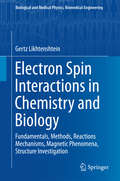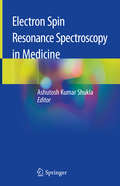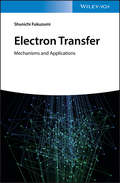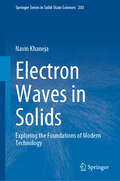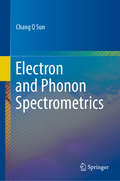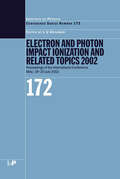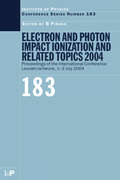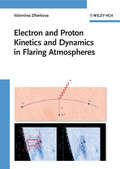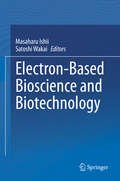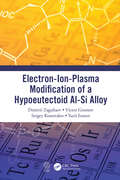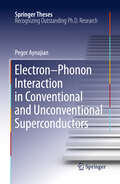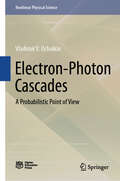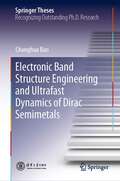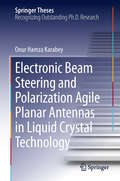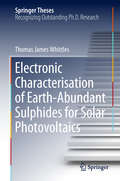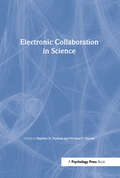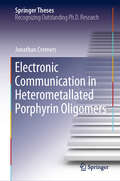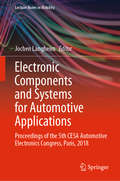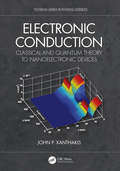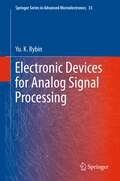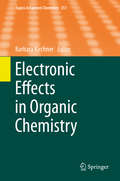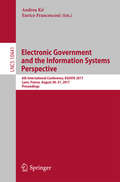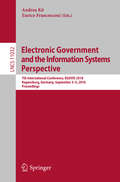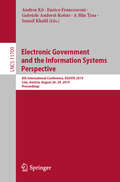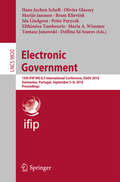- Table View
- List View
Electron Spin Interactions in Chemistry and Biology
by Gertz LikhtenshteinThis book presents the versatile and pivotal role of electron spin interactions in nature. It provides the background, methodologies and tools for basic areas related to spin interactions, such as spin chemistry and biology, electron transfer, light energy conversion, photochemistry, radical reactions, magneto-chemistry and magneto-biology. The book also includes an overview of designing advanced magnetic materials, optical and spintronic devices and photo catalysts. This monograph will be of interest to scientists and graduate students working in the areas related to spin interactions physics, biophysics, chemistry and chemical engineering.
Electron Spin Resonance Spectroscopy in Medicine
by Ashutosh Kumar ShuklaThis book examines various applications of electron spin resonance spectroscopy (ESR) in medicine, covering topics such as interactions between blood and nanoparticles, physical intricacy of HbNO complexes, parasitic diseases, oxidative stress measurement, polymerization of resinous materials used in dentistry, tooth dosimetry and dermatological applications. Instead of providing mathematical details, it focuses on the applications and data interpretation of ESR as an emerging tool. This book is intended for students and researchers interested in the field of ESR applications in translational research and medicine.
Electron Transfer: Mechanisms and Applications
by Shunichi FukuzumiWritten by one of the top scientists in this field, this is a systematic overview of the fundamental concepts and powerful applications. The author presents the central theories and mechanisms in electron transfer, followed by several systems in nature where this is important, while also covering modern green applications. An invaluable resource for graduate students and researchers working in this field in academia and industry.
Electron Waves in Solids: Exploring the Foundations of Modern Technology (Springer Series in Solid-State Sciences #203)
by Navin KhanejaThis book explores the intricate world of electron behavior within solids, revealing them to be waves—a fundamental insight crucial to grasping modern electronics, computing, and solid-state devices. This comprehensive examination elucidates the factors determining material conductivity, distinguishing between conductors, insulators, and semiconductors. Through detailed analysis, the text illuminates the thermal agitation of solids, manifesting as vibrations known as phonons, which impede electron flow and contribute to electrical resistance. Readers gain insight into the production of electronic devices through semiconductor doping, exploring various device types and their functionalities. The book further investigates the temperature-dependent behavior of metal resistance, including the phenomenon of superconductivity, wherein resistance vanishes entirely at low temperatures—a phenomenon comprehensively elucidated within these pages. Moreover, the text unravels the mysteries of magnetism in solids, exploring how certain metals, such as iron, exhibit permanent magnetism. By probing into the underlying causes of magnetism, readers gain a deeper understanding of solid-state physics. Additionally, the book explores imaging techniques such as X-rays, offering insights into how scientists peer inside solids to decipher their internal structures and properties. Geared toward scientists and engineers, the book serves as an indispensable resource for mastering the foundational concepts of solid-state physics—a discipline indispensable to modern technology.
Electron and Phonon Spectrometrics
by Chang Q SunThis book presents the latest advances and future trends in electron and phonon spectrometrics, focusing on combined techniques using electron emissions, electron diffraction, and phonon absorption and reflection spectrometrics from a substance under various perturbations to obtain new information on bond-electron-phonon dynamics. Discussing the principles of the bond order-length-strength (BOLS) correlation, nonbonding electron polarization (NEP), local bond average (LBA), and multi-field lattice oscillation dynamics for systems under perturbation, the book covers topics like differential photoelectron/phonon spectrometrics (DPS), which distils transition of the length, energy, stiffness and the fraction of bonds upon chemical or physical conditioning; and the derived performance of electrons in various bands in terms of quantum entrapment and polarization. This book appeals to researchers, scientists and engineers in the fields of chemistry, physics, surface and interface science, and materials science and engineering who are interested in electron and phonon spectrometrics.
Electron and Photon Impact Ionisation and Related Topics 2002: Proceedings of the International Conference on Electron and Photon Impact Ionisation and Related Topics, Metz, France, 18 to 20 July 2002 (Institute of Physics Conference Series)
by L U AncaraniElectron and Photon Impact Ionisation and Related Topics 2002 provides an overview of recent international research in the field of ionization by electron and photon impact. Emphasizing multi-particle coincidence studies, such as (e,2e), (e,3e), ionization-excitation, and double photo-ionization, the book contains 18 contributions of recent experim
Electron and Photon Impact Ionization and Related Topics 2004: Proceedings of the International Conference Louvain-la-Neuve, 1-3 July 2004 (Institute of Physics Conference Series)
by B PirauxThis volume provides an overview of the latest advances in the field of ionization by electron and photon impact. The book contains 18 contributions of recent experimental, theoretical, and computational work on correlated processes that involve a wide range of targets, including atoms, molecules, clusters, and surfaces. It covers a broad range of current topics, such as multi-particle coincidence studies, in particular, (e,2e) and (e,3e) processes, photoionization with or without excitation, and multiphoton single and double ionization. Three chapters contain the following topics: anisotropy and polarization in Auger-electron emission, multiple ionization of atoms in strong fields, and theoretical and practical aspects of photoionization with excitation.
Electron and Proton Kinetics and Dynamics in Flaring Atmospheres
by Valentina ZharkovaThis timely book presents new research results on high-energy particle physics related to solar flares, covering the theory and applications of the reconnection process in a clear and comprehensible way. It investigates particle kinetics and dynamics in flaring atmospheres and their diagnostics from spectral observations, while providing an analysis of the observation data and techniques and comparing various models.Written by an internationally acclaimed expert, this is vital reading for all solar, astro-, and plasma physicists working in the field.
Electron-Based Bioscience and Biotechnology
by Masaharu Ishii Satoshi WakaiThis book offers a comprehensive introduction to electron-based bioscience, biotechnology, and biocorrosion. It both explains the importance of electron flow during metabolic processes in microorganisms and provides valuable insights into emerging applications in various fields. In the opening section, readers will find up-to-date information on topics such as electron transfer reactions, extracellular electron transfer mechanisms, direct interspecies electron transfer, and electron uptake by sulfate-reducing bacteria. The focus then shifts to state-of-the-art advances and applications in the field of biotechnology. Here, the coverage encompasses e.g. progress in understanding electrochemical interactions between microorganisms and conductive particles, enzymatic reactions and their application in the bioproduction of useful chemicals, and the importance of redox balance for fatty acid production. In closing, the book addresses various aspects of the complex phenomenon of microbiologically induced corrosion, highlighting novel insights from the fields of electromicrobiology and electrochemistry and their implications.
Electron-Ion-Plasma Modification of a Hypoeutectoid Al-Si Alloy
by Dmitrii Zaguliaev Victor Gromov Sergey Konovalov Yurii IvanovElectron-Ion-Plasma Modification of a Hypereutectic Al-Si Alloy details theoretical and experimental research and computer simulation of structural phase transformations in AlSi10Mn2Ni Silumin on different scale levels under electroexplosion alloying, electron beam processing and electron-plasma alloying at the nanolevel in order to create new materials. The authors summarize and analyze more than 10 years of research on the electron-ion-plasma effect on strength properties and structure-phase states’ transformations of hypoeutectic Silumin. Key Features: Details physical and mathematical models of mechanisms of surface layer hardening under conditions of varying energy effects Offers insights into improved strength characteristics of Silumin Explores optimal processing modes for increased strength and improved tribological characteristics This book is a valuable resource to researchers and engineers involved with the modification of light alloy surfaces for the automotive and aeronautical industry.
Electron-Phonon Interaction in Conventional and Unconventional Superconductors
by Pegor AynajianThe problem of conventional, low-temperature superconductivity has been regarded as solved since the seminal work of Bardeen, Cooper, and Schrieffer (BCS) more than 50 years ago. However, the theory does not allow accurate predictions of some of the most fundamental properties of a superconductor, including the superconducting energy gap on the Fermi surface. This thesis describes the development and scientific implementation of a new experimental method that puts this old problem into an entirely new light. The nominee has made major contributions to the development and implementation of a new experimental method that enhances the resolution of spectroscopic experiments on dispersive lattice-vibrational excitations (the "glue" responsible for Cooper pairing of electrons in conventional superconductors) by more than two orders of magnitude. Using this method,he has discovered an unexpected relationship between the superconducting energy gap and the geometry of the Fermi surface in the normal state, both of which leave subtle imprints in the lattice vibrations that could not be resolved by conventional spectroscopic methods. He has confirmed this relationship on two elemental superconductors and on a series of metallic alloys. This indicates that a mechanism qualitatively beyond the standard BCS theory determines the magnitude and anisotropy of the superconducting gap.
Electron-Photon Cascades: A Probabilistic Point of View (Nonlinear Physical Science)
by Vladimir V. UchaikinThis book demonstrates the practical application of an alternative approach to current problems in high-energy astrophysics. In high-energy astrophysical processes, single collisions are accompanied by the appearance of many secondary particles with different properties. To describe the infinitesimal evolution of such a system at a measurement instant, as is commonly done when deriving the kinetic equation for the system with conserved number of particles, one must know either its prehistory or the infinite family of many-particle distributions. An alternative to this approach is to use an adjoint (in the sense of Lagrange) mathematical formalism, where the independent active variable is the phase position of a primary particle generating the cascade, and the dependent variable has the form of a functional of the cascade as a whole, interpreted as the reading of some not necessarily linear (additive) detector. This approach is characterized by mathematical efficiency: no matter how many particles are formed in a cascade, the active argument of the desired functional always remains one particle. The second advantage is its generality: the formalization of the readings of the detector, which performs real measurements through the functionality of a random implementation of the cascade, allows it to be applied to a wide range of actually used devices and installations.Readers will be able to master the fundamentals of particle astrophysics in the context of the latest developments in the field. It will benefit graduate students and established researchers alike, equipping them with the knowledge and tools necessary to design and interpret their own experiments and, ultimately, to address a number of questions about the nature and origin of cosmic particles that have arisen in recent research.
Electronic Band Structure Engineering and Ultrafast Dynamics of Dirac Semimetals (Springer Theses)
by Changhua BaoThis book highlights the doctoral research of the author on electronic band structure engineering and ultrafast dynamics of Dirac semimetals. Dirac semimetals exhibit unique electronic band structure and novel physical properties with rich light-matter interaction, which inspires a wide range of potential applications. Enabling band engineering and revealing ultrafast dynamics of Dirac semimetals is therefore important. In the research work covered by the book, the first ultrafast time- and angle-resolved photoemission spectroscopy with tunable probe photon energy is developed, providing new opportunities for exploring ultrafast dynamics in 3D quantum materials. Using the spectroscopy, the author investigates the band structure engineering and ultrafast dynamics of Dirac semimetals, realizing the long-sought-after chiral symmetry breaking in a Kekulé-ordered graphene with flat band and revealing the ultrafast dynamics of Dirac fermions in 3D Dirac semimetal for the first time. The work advances the research of the electronic structure of Dirac semimetals in two aspects. Firstly, it identifies the Kekulé-ordered graphene as a new system for exploring chiral symmetry breaking- related physics and flat band- induced instability, providing a very rare system to investigate their interplay. Secondly, it solves the long-standing challenge of directly visualizing the non-equilibrium electronic structure of 3D Dirac semimetal and opens up new opportunities for exploring the light-matter interaction in 3D quantum materials, especially the light-induced topological phase transitions in 3D topological materials.
Electronic Beam Steering and Polarization Agile Planar Antennas in Liquid Crystal Technology
by Onur Hamza KarabeyThis book describes the characterization of liquid crystal materials at microwave frequencies and the usage of these materials in reconfigurable planar antennas and in their electrical tunable components. It reports for the first time the realization of a two-dimensional electronic beam steering antenna and polarization agile planar antennas with liquid crystal display technology. It gives a detailed description of all the theoretical analyses, modeling and design methods that were involved in the realization of these devices as well as their validation using measurement of demonstrative prototypes. This book also shows that low profile, low cost, high gain, electronic beam steering and polarization agile antennas can be fabricated in larger sizes by using existing automated liquid crystal display manufacturing techniques. The innovative ideas and method described in this work represent a considerable advancement in the field of electronically reconfigurable antennas based on liquid crystal technology and are expected to draw significant interest in the future. Such antennas may become important, for example, in mobile terminals integrated into the body of laptops (in the cover) or of automobiles (in the rooftop), ships or boats, for which flat, low-profile and low-cost antennas are required.
Electronic Characterisation of Earth‐Abundant Sulphides for Solar Photovoltaics (Springer Theses)
by Thomas James WhittlesThis book examines the electronic structure of earth-abundant and environmentally friendly materials for use as absorber layers within photovoltaic cells. The corroboration between high-quality photoemission measurements and density of states calculations yields valuable insights into why these materials have demonstrated poor device efficiencies in the vast literature cited. The book shows how the materials’ underlying electronic structures affect their properties, and how the band positions make them unsuitable for use with established solar cell technologies. After explaining these poor efficiencies, the book offers alternative window layer materials to improve the use of these absorbers. The power of photoemission and interpretation of the data in terms of factors generally overlooked in the literature, such as the materials’ oxidation and phase impurity, is demonstrated. Representing a unique reference guide, the book will be of considerable interest and value to members of the photoemission community engaged in solar cell research, and to a wider materials science audience as well.
Electronic Collaboration in Science (Progress in Neuroinformatics Research Series)
by Michael F. Huerta Stephen H. KoslowThe increasingly sophisticated and powerful information technology we are creating plays an ever more prominent role in facilitating interaction and cooperation in everyday life. The time has come to harness it in the service of scientific research. This pathbreaking book describes the technical and social challenges and opportunities of electronic collaboration and offers specific examples of the ways in which it has not only facilitated but in some cases enabled work by scientists. Key players all, the chapter authors illuminate the general issues with their first-hand accounts. Very few researchers today can work in isolation. Electronic Collaboration in Science provides the first clear road map for all whose investigations are leading them into this fascinating new multidisciplinary domain.
Electronic Communication in Heterometallated Porphyrin Oligomers (Springer Theses)
by Jonathan CremersThis book cuts across the divisions of organic, inorganic, and physical chemistry. It describes new methods for creating π-conjugated porphyrin oligomers with precisely defined sequences of zinc and copper metal cations, and how EPR spectroscopy was used to investigate the dipolar and exchange coupling between the paramagnetic copper(II) centres.Porphyrins are a group of heterocyclic macrocycle organic compounds that play an important role in our everyday life and can for example be found in blood where they form a red complex with iron (haem). Various metallic elements can be inserted into a porphyrin and changing the coordinated metal is an excellent way to influence the chemical and physical properties of these molecules. Focusing on 3 metals - zinc, magnesium and copper - the author established new methods for creating π-conjugated porphyrin oligomers and lastly presents the synthesis and investigation of two novel porphyrin nanoballs. Giving the template-directed strategy the author developed for constructing these molecules, this work could provide access to other related nano-cages.
Electronic Components and Systems for Automotive Applications: Proceedings of the 5th CESA Automotive Electronics Congress, Paris, 2018 (Lecture Notes in Mobility)
by Jochen LangheimThis volume collects selected papers of the 5th CESA Automotive Electronics Congress, Paris, 2018. CESA is the most important automotive electronics conference in France. The topical focus lies on state-of-the-art automotive electronics with respect to energy consumption and autonomous driving. The target audience primarily comprises industry leaders and research experts in the automotive industry.
Electronic Conduction: Classical and Quantum Theory to Nanoelectronic Devices (Textbook Series in Physical Sciences)
by John P. XanthakisElectronic Conduction: Classical and Quantum Theory to Nanoelectronic Devices provides a concise, complete introduction to the fundamental principles of electronic conduction in microelectronic and nanoelectronic devices, with an emphasis on integrating the quantum aspects of conduction. The chapter coverage begins by presenting the classical theory of conduction, including introductory chapters on quantum mechanics and the solid state, then moving to a complete presentation of essential theory for understanding modern electronic devices. The author’s unique approach is applicable to microscale and nanoscale device simulation, which is particularly timely given the explosion in the nanoelectronics field. Features Self-contained Gives a complete account of classical and quantum aspects of conduction in nanometer scale devices Emphasises core principles, the book can be useful to electrical engineers and material scientists, and no prior course in semiconductors is necessary Highlights the bridge to modern electronics, first presenting the physics, and then the engineering complications related to quantum behaviour Includes many clear, illustrative diagrams and chapter problem sets Gives an account of post-Silicon devices such as the GaAs MOSFET, the CNT-FET and the vacuum transistor Showcases why quantum mechanics is necessary with modern devices due to their size and corresponding electron transport properties Discusses all the issues that will enable readers to conduct their own research
Electronic Devices for Analog Signal Processing
by Yu. K. RybinElectronic Devices for Analog Signal Processing is intended for engineers and post graduates and considers electronic devices applied to process analog signals in instrument making, automation, measurements, and other branches of technology. They perform various transformations of electrical signals: scaling, integration, logarithming, etc. The need in their deeper study is caused, on the one hand, by the extension of the forms of the input signal and increasing accuracy and performance of such devices, and on the other hand, new devices constantly emerge and are already widely used in practice, but no information about them are written in books on electronics. The basic approach of presenting the material in Electronic Devices for Analog Signal Processing can be formulated as follows: the study with help from self-education. While divided into seven chapters, each chapter contains theoretical material, examples of practical problems, questions and tests. The most difficult questions are marked by a diamond and can be given to advanced readers. Paragraphs marked by /// are very important for the understanding of the studied material and together they can serve a brief summary of a section. The text marked by italic indicates new or non-traditional concepts. Calculated examples are indicated by >. The main goal of Electronic Devices for Analog Signal Processing is not only to give some knowledge on modern electronic devices, but also to inspire readers on the more detailed study of these devices, understanding of their operation, ability to analyze circuits, synthesize new devices, and assess the possibilities of their application for solution of particular practical problems.
Electronic Effects in Organic Chemistry
by Barbara KirchnerThe series Topics in Current Chemistry presents critical reviews of the present and future trends in modern chemical research. The scope of coverage is all areas of chemical science including the interfaces with related disciplines such as biology, medicine and materials science. The goal of each thematic volume is to give the non-specialist reader, whether in academia or industry, a comprehensive insight into an area where new research is emerging which is of interest to a larger scientific audience. Each review within the volume critically surveys one aspect of that topic and places it within the context of the volume as a whole. The most significant developments of the last 5 to 10 years are presented using selected examples to illustrate the principles discussed. The coverage is not intended to be an exhaustive summary of the field or include large quantities of data, but should rather be conceptual, concentrating on the methodological thinking that will allow the non-specialist reader to understand the information presented. Contributions also offer an outlook on potential future developments in the field. Review articles for the individual volumes are invited by the volume editors. Readership: research chemists at universities or in industry, graduate students
Electronic Government and the Information Systems Perspective: 6th International Conference, EGOVIS 2017, Lyon, France, August 28-31, 2017, Proceedings (Lecture Notes in Computer Science #10441)
by Enrico Francesconi Andrea KőThis book constitutes the refereed proceedings of the 6th International Conference on Electronic Government and the Information Systems Perspective, EGOVIS 2017, held in Lyon, France, in August 2017. The 20 revised full papers presented were carefully reviewed and selected from 24 submissions. The papers areorganized in the following topical sections: digitalization and transparency; open data ecosystems; intelligent systems in e-government; e-government research and intelligent systems; m-government and inclusion; e-government cases - data knowledge management; and knowledge management in the context of e-government.
Electronic Government and the Information Systems Perspective: 7th International Conference, EGOVIS 2018, Regensburg, Germany, September 3–5, 2018, Proceedings (Lecture Notes in Computer Science #11032)
by Enrico Francesconi Andrea KőThis book constitutes the refereed proceedings of the 7th International Conference on Electronic Government and the Information Systems Perspective, EGOVIS 2018, held in Regensburg, Germany, in September 2018. The 19 revised full papers presented were carefully reviewed and selected from 22 submissions. The papers are organized in the following topical sections: digitalization and transparency; challenges in e-government technology and e-voting; knowledge management in the context of e-government; semantic technologies and the legal aspects; open data and open innovation; and e-government cases - data and knowledge management.
Electronic Government and the Information Systems Perspective: 8th International Conference, EGOVIS 2019, Linz, Austria, August 26–29, 2019, Proceedings (Lecture Notes in Computer Science #11709)
by Enrico Francesconi Andrea Kő Ismail Khalil A Min Tjoa Gabriele Anderst-KotsisThis book constitutes the refereed proceedings of the 8th International Conference on Electronic Government and the Information Systems Perspective, EGOVIS 2019, held in Linz, Austria, in August 2019. The 17 full papers presented were carefully reviewed and selected from 25 submissions. The papers are organized in the following topical sections: open data and open innovation; data-driven approaches in e-government; e-government cases – data and knowledge management; e-government theoretical background; and digitalization and transparency.
Electronic Government: 15th IFIP WG 8.5 International Conference, EGOV 2016, Guimarães, Portugal, September 5-8, 2016, Proceedings (Lecture Notes in Computer Science #9820)
by Efthimios Tambouris Maria A. Wimmer Delfina Sá Soares Tomasz Janowski Hans Jochen Scholl Marijn Janssen Bram Klievink Ida Lindgren Peter Parycek Olivier GlasseyThis book constitutes the refereed proceedings of the 15th IFIP WG 8.5 International Conference on Electronic Government, EGOV 2016, held in Guimaraes, Portugal, in September 2016, in conjunction with the 8th International Conference on eParticipation, ePart 2016. The 24 revised full papers presented were carefully reviewed and selected from 87 submissions. The papers are clustered under the following topical sections: foundations; benchmarking and evaluation; information integration and governance; services; evaluation and public values; EGOV success and failure; governance; social media; engagement; processes; policy-making; trust, transparency and accountability; open government and big/open data; smart government/governance/cities.
